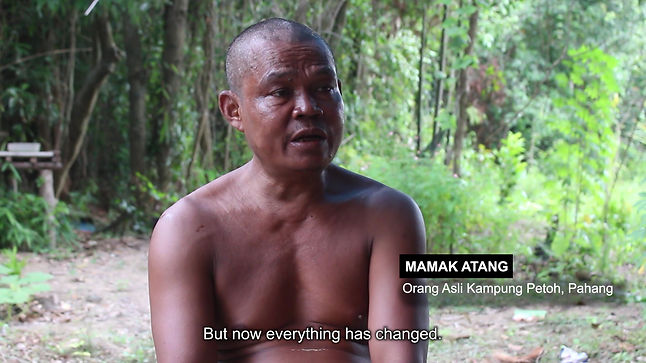As part of the Weaving Hopes for the Future exhibition, a team of four young Orang Asli documentary makers have developed a compendium of short films that explore the connections between Indigenous land rights in Malaysia and the climate crisis.
The documentaries, available below, are focused on the stories of the Indigenous Jakun tribe in Rompin, a district in the southeast of Pahang state in Peninsular Malaysia. The filmmakers recorded interviews with women, healers, elders and activists who have witnessed how their land has transformed in the past decade.
They discuss significant and persistent issues that plague Orang Asli land and livelihoods, such as water pollution and logging and awareness of the climate crisis. Indigenous communities are sensitive to even the slightest changes in their natural environment.
They speak of extreme weather events, and how the continued destruction is complicating -- and in some cases, outright destroying -- their sense of identity.
Who are the Orang Asli without their forests?
However, there is hope. Orang Asli communities are rallying around the environmental justice call and community-led resilience projects to rebuild resistance against the climate crisis. Many are also working closely with civil society groups to push for good governance, research and policymaking. Indigenous wisdom is a big part of climate adaptation, survival, and future security -- these documentaries speak to that entrenched wisdom with the power of their voices.
Customary Land : Our Land, Our Life

For the Orang Asli, the forest is not just a forest; it’s a market. The land is not just land, it’s where their ancestors were born, and it’s a responsibility passed down through the generations.
The elders talk about the forest as a rich source (hasil) that supports their health and survival, and as one Indigenous woman from the Jakun community puts it, the forest represents life. “Without it, everything dies.”
But this home has always been under threat, whether from unsustainable development, water or air pollution, or deforestation, making it hard to rely solely on the forest for survival. In this documentary, we see the impacts of a warming climate on Orang Asli communities.
Who is responsible for protecting Orang Asli communities against climate injustice?
Tanah Kami
(Our land)

Imah is a mother and a Jakun community leader in Kampung Petoh, an Orang Asli village of about 500 people. In this documentary, she shares her struggle to save the village from development projects that are beginning to encroach on Orang Asli land. She describes becoming the subject of intense surveillance and scrutiny from authorities who view her as a rebel, worsening her mental health.
Kampung Petoh is one of the last villages that has kept their pristine forest, unlike other areas which have become overrun with development projects. However, in 2020, Kampung Petoh was again threatened by a mega-development project that has yet to be resolved.
Nilai Spiritual Orang Asli
(The Spiritual Beliefs of Orang Asli)

By and large, Orang Asli communities practise a form of animism, which is rooted in their connection with the natural world. In this documentary, we learn about these beliefs, such as their belief in spiritual entities who live with and guide them. We also hear about “berubat” (healing) ceremonies, which are still practised by Jakun people today.
However, climate change is affecting these Indigenous practices and beliefs. With more environmental degradation and extreme weather events, sacred places are diminishing, and it’s becoming harder to find specific plants, herbs, and fruits used in the berubat ceremony.
Wanita dan Hutan
(Women and the Forest)

What may seem normal to us is integral to Indigenous Peoples as sources of food and healing. The forest is an essential resource for the materials women need to make medicines.
In this documentary, we hear an account about how Orang Asli women have to journey deeper into the forest to gather what they need or labour to grow these plants themselves. In another instance, we hear about the green water phenomenon, a folkloric belief among the Jakun community that the Rompin river water has healing benefits.
However, as climate change wreaks havoc on the environment, these cycles have become irregular and have devastated Orang Asli communities, which take years to recover from such disasters.

